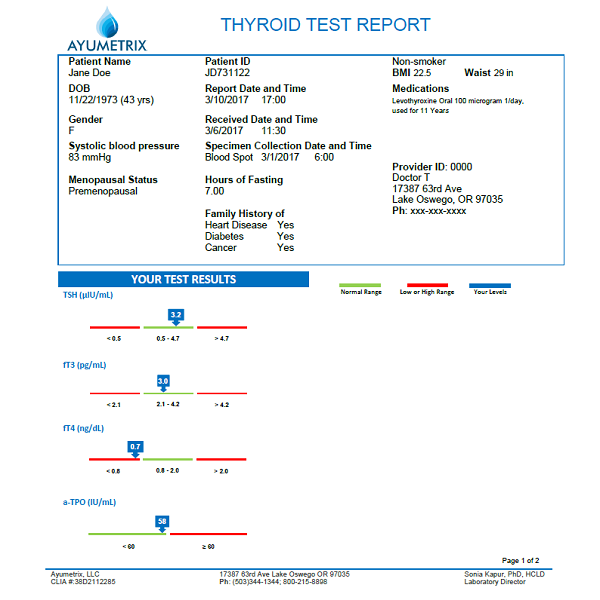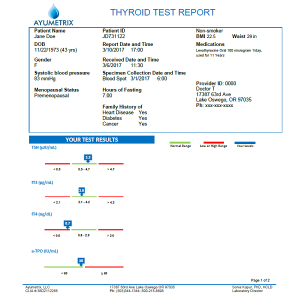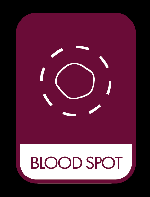Home / Shop
Ayumetrix Thyroid Blood Spot Test








- Description
- Specifications
- Customer Reviews (0)
The Ayumetrix Thyroid Blood Spot Test is an at home test which reports levels of Thyroid hormones. It can be used by male or female patients. You receive a collection kit for simple blood spot samples. The kit comes with prepaid shipping back to the lab, and results are sent to your email.
Thyroid Blood Spot Test
- Doctor’s order not required
- No lab visit or office visit required
- Shipping Free within US
- Prepaid return shipping label included
- Simple finger prick, blood spot collection
- Quick Results
What do the Thyroid markers mean?
TSH (Thyroid-Stimulating Hormone)
Thyroid-stimulating hormone (TSH) levels are elevated in primary hypothyroidism. In primary hyperthyroidism, TSH levels are low. TSH is important in evaluating thyroid function. It is especially useful in the differential diagnosis of primary (thyroid) from secondary (pituitary) and tertiary (hypothalamus) hypothyroidism. In primary hypothyroidism, TSH levels are significantly elevated, while in secondary and tertiary hypothyroidism, TSH levels are low or normal. Elevated or low TSH in the context of normal free thyroxine is often referred to as sub-clinical hypo- or hyperthyroidism, respectively.
fT3 (Free Triiodothyronine)
This is the active thyroid hormone. It is short lived, lasting only about a day. Only 0.3% of the total T3 is unbound (free); it is otherwise bound to thyroxine binding globulin and albumin. In hyperthyroidism, both T3 and T4 levels (total and free) are usually elevated. But in a small subset of hyperthyroid patients only T3 is elevated.
fT4 (Free Thyroxine)
Free T4 is essentially the storage thyroid hormone. It lasts about a week in the body. Free thyroxine (fT4) comprises a small fraction of total thyroxine. The fT4 is available to the tissues and is, therefore, the metabolically active fraction. Elevations in fT4 cause hyperthyroidism, while decreases in T4 causes hypothyroidism.
TPO (Thyroperoxidase Antibodies)
Anti-TPO antibodies are thought to be significantly involved in thyroid dysfunction and the development of hypothyroidism. In patients with sub-clinical hypothyroidism, the presence of TPO antibodies, predicts a higher risk of developing overt hypothyroidism, 4.3% per year versus 2.1% per year in antibody-negative individuals. Such patients may be at risk of developing other autoimmune diseases, such as adrenal insufficiency and type 1 diabetes.
RT3 (Reverse T3)
Reverse T3 inhibits thyroid activity. This thyroid marker is a very important measurement of thyroid function. Levels of Reverse T3 increase with stress, and reduce the effectiveness of T3. The ratio of fT3 to RT3 is found by dividing the free T3 measurement by the Reverse T3. This ratio should be at least 20.
NOTE: Your Thyroid report will be sent to the email used when ordering, unless otherwise specified. If you have further questions after receiving your report, a Telehealth Appointment with Dr. Ray Psonak is available.
FAQ's about At Home Health Tests
Thyroid Markers Measured
Thyroid Test markers: TSH, fT3, fT4, TPO
Thyroid Plus Test markers: TSH, fT3, fT4, TPO Plus RT3 (Reverse T3)
Sample collection instructions (YouTube video)
